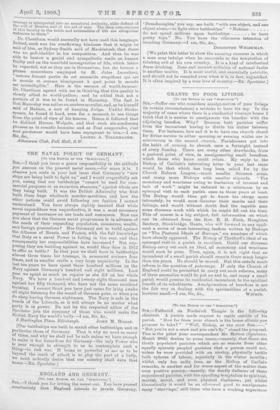GRANTS TO POOR LIVINGS.
[To TIEN EDITOR OF TIM "SPEOCATOR.1
Sr,—Suffer one who considers amalgamation of poor livings (in certain circumstances) a mistake to have his say. In the majority of cases where there is a residential vicarage house I think that it is unwise to amalgamate the benefice with the adjoining benefice. Why Because both parishes suffer from the incumbent having to divide his duties between them. For instance, how sad it is to have one church closed for divine service in either morning or evening whilst one is ministering in the second church. Parishioners get into the habit of coming to church once a fortnight instead of every Sunday. There are many other drawbamks, from a pastoral point of view, in amalgamating small benefices, which those who know could relate. My reply to the Bishop of Carlisle's interesting letter in your last issue would be that which has long been asked for by the Church Reform Leagne,—much smaller diocesan areas, and many more Bishops with smaller stipends. " The monotony and weariness owing to limitation of interest and lack of work" might be reduced to a minimum by an episcopal visit to each parish once in three years at least. The Bishop would then get to know his 'clergy more intimately, he would soon discover their merits and their failings, and would without doubt find the capable man some diocesan work with which he might fill out his time. This of course is a big subject, full information on which can be obtained from the Rev. E. H. Firth, Houghton Rectory, Stockbridge, Hants, who will forward to any appli- cant a series of most interesting leaflets written by Bishops on "The Pastoral Ideals of Bishops," six numbers of which have already appeared. The Bishop of Thetfoas ideal of an episcopal visit to a parish is excellent. Could our diocesan Bishop carry out such an ideal, all monotony and weariness would soon be gone. Then, again, it is not right that an incumbent of a small parish should remain there much longer than ten years. He should be moved. But this entails much reform in the question of patronage. If only the Church of England could be permitted to carry out such reforms, many of these anomalies would be put an end to, and many a small parish would possess its residential incumbent, to the spiritual benefit of its inhabitants. Amalgamation of benefices is not the fair way in dealing with the spiritualities of a parish, however small.—I am, Sir, &c.,










































 Previous page
Previous page